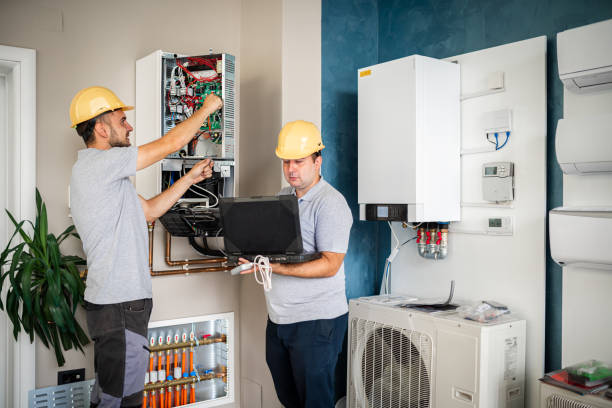A home generator is more than just a backup power solution; it’s a safeguard for your household’s comfort, safety, and functionality during unexpected outages. Whether you’re facing a natural disaster, utility failure, or planned grid maintenance, your generator ensures uninterrupted power to essential appliances and systems. However, like any mechanical device, a generator requires proper care to operate effectively and reliably.
Neglecting maintenance can lead to reduced efficiency, unexpected failures, and even hazardous situations such as electrical fires or carbon monoxide leaks. This comprehensive guide provides a deep dive into the best practices for home generator maintenance, including which tasks you can handle yourself, when to call a professional, and how to avoid common pitfalls. With this knowledge, you can extend the life of your generator, keep it running smoothly, and ensure it’s ready to power your home when you need it most.
Why Home Generator Maintenance Is Essential
Home generators play a critical role during power outages, but their reliability depends on regular maintenance. Here’s why home generator maintenance is non-negotiable:
- Dependability During Emergencies
A neglected generator is far more likely to fail when it’s needed most. Routine maintenance ensures that the unit starts promptly and delivers consistent power. - Fuel Efficiency
A well-maintained generator consumes fuel more efficiently, saving you money and reducing the environmental impact. Issues like clogged air filters or worn spark plugs can significantly decrease efficiency. - Extended Lifespan
Regular care helps prevent wear and tear on critical components, prolonging the life of your generator. This protects your investment and delays the need for costly replacements. - Safety Assurance
Generators pose safety risks if not properly maintained. For example, leaking fuel lines or faulty connections can lead to fires or carbon monoxide poisoning. Regular checks mitigate these hazards.
By committing to maintenance, you’re not just keeping your generator operational—you’re protecting your home and loved ones from unexpected disruptions and potential dangers.

DIY Generator Maintenance: What You Can Handle
For homeowners willing to invest time and effort, several home generator maintenance tasks can be done independently. These tasks require basic tools, a good understanding of your generator’s user manual, and adherence to safety protocols.
- Regular Inspections
Check your generator for signs of wear, corrosion, or damage. Look for loose wires, debris buildup, and obstructions in vents. Inspect the fuel system for leaks or damage. - Oil Changes
Oil is the lifeblood of your generator’s engine. Depending on usage and manufacturer recommendations, change the oil after 50-200 hours of operation or at least once a year. Always use the oil type specified in the manual. - Air Filter Maintenance
The air filter prevents dust and debris from entering the engine. Check it monthly, clean it if it’s dusty, and replace it if it shows signs of wear. A clogged filter can reduce efficiency and cause overheating. - Battery Care
Ensure that the generator’s battery is fully charged and the terminals are clean and securely connected. Consider investing in a trickle charger to maintain battery health. - Running a Test Cycle
Operate your generator for 20-30 minutes once a month. This keeps internal components lubricated, ensures the generator is operational, and helps you detect potential issues before an emergency.
These tasks can be handled by most homeowners with a bit of preparation and the right tools.

When to Call a Professional for Generator Maintenance
While DIY maintenance covers the basics, some aspects of home generator maintenance are too complex or dangerous to handle without professional expertise. Calling in a professional ensures that your generator is inspected and serviced with advanced tools and knowledge.
- Electrical Component Inspections
Professionals use specialized tools to test the generator’s output and verify that it meets manufacturer specifications. They also check for issues like worn connections or faulty circuit boards. - Internal Engine Repairs
Issues such as fuel line leaks, valve adjustments, or alternator repairs require specialized knowledge and tools. Attempting these repairs without expertise can worsen the problem. - Warranty Compliance
Many generator warranties mandate professional maintenance at regular intervals. Skipping professional servicing could void your warranty, leading to out-of-pocket repair costs. - Annual Comprehensive Service
A yearly professional checkup ensures that the generator’s internal components, such as the fuel injectors and electrical system, are in good condition. It also includes advanced diagnostics to prevent future failures.
Combining professional services with DIY maintenance ensures that your generator remains in top condition, ready to perform during emergencies.

Common Mistakes to Avoid in Home Generator Maintenance
Even the most well-intentioned homeowners can make mistakes when maintaining their generators. Avoid these pitfalls to protect your equipment and your home:
- Ignoring Routine Maintenance
Skipping oil changes, inspections, or test cycles can lead to significant damage over time. Consistency is key to preventing costly repairs. - Using Incorrect Fuel or Oil
Always use the fuel and oil type specified in the user manual. Using improper products can damage the engine and void your warranty. - Overloading the Generator
Running the generator beyond its rated capacity can cause overheating and damage. Calculate your power needs accurately to avoid this mistake. - Neglecting Safety Precautions
Always turn off the generator and let it cool before performing any maintenance tasks. Wear gloves and eye protection to prevent injuries. - Improper Storage
Store your generator in a clean, dry, and ventilated space. Avoid exposure to moisture or extreme temperatures, which can damage components.
By steering clear of these mistakes, you can save yourself the expense and hassle of unnecessary repairs.

Creating a Home Generator Maintenance Schedule
A structured maintenance schedule is essential for keeping your generator in top condition. Here’s a sample plan to guide you:
- Monthly Tasks
- Run a test cycle for 20-30 minutes.
- Inspect for visible damage, loose connections, and debris buildup.
- Clean or replace air filters if necessary.
- Quarterly Tasks
- Check and tighten battery connections.
- Inspect fuel lines and hoses for leaks.
- Ensure vents and exhaust outlets are unobstructed.
- Annual Tasks
- Change the oil and oil filter.
- Replace spark plugs.
- Schedule a professional service for a comprehensive inspection.
Stick to this schedule to maximize your generator’s reliability and lifespan.
Conclusion
Home generators are indispensable during power outages, but their reliability hinges on regular maintenance. By following the best practices outlined here—balancing DIY efforts with professional expertise, avoiding common mistakes, and adhering to a structured maintenance schedule—you can ensure your generator’s efficiency, longevity, and safety.
For businesses looking to amplify their online presence, Marketing Technology offers cutting-edge SEO services and content marketing solutions. Let us help you craft impactful, optimized content to drive traffic and engagement. Contact us today to learn more!
Frequently Asked Questions
What maintenance does a home generator need?
Home generator maintenance includes regular oil changes, air filter cleaning, battery checks, and running monthly test cycles. Professional inspections should be conducted annually.
What is the monthly maintenance on a generator?
Monthly maintenance involves running a test cycle, inspecting for damage or debris, and ensuring air filters are clean. These tasks keep the generator operational and ready for use.
How long can a generator run without an oil change?
Generators typically need an oil change after 50-200 hours of use, depending on the manufacturer’s guidelines. Running beyond this can lead to engine damage.




